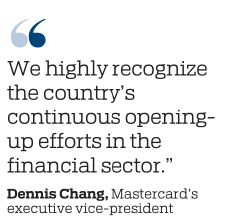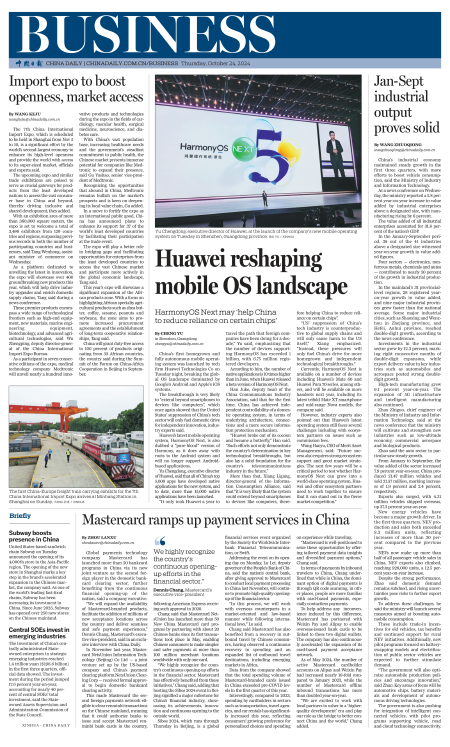
Global payments technology company Mastercard has launched more than 50 bankcard programs in China via its new joint venture as the second foreign player in the domestic bankcard clearing sector, further benefiting from the continuous financial opening-up of the nation, said a company executive.
"We will expand the availability of Mastercard-branded products, facilitate the addition of millions of new acceptance locations across the country and deliver seamless and safe payment experiences," Dennis Chang, Mastercard's executive vice-president, said in an exclusive interview with China Daily.
In November last year, Mastercard NetsUnion Information Technology (Beijing) Co Ltd — a joint venture set up by the US-based company and China's payment clearing platform NetsUnion Clearing Corp — received formal approval to begin domestic bankcard clearing activity.
This made Mastercard the second foreign payments network eligible to clear renminbi transactions on the Chinese mainland, meaning that it could authorize banks to issue and accept Mastercard renminbi bank cards in the country, following American Express receiving such approval in 2020.
Chang said that Mastercard NetsUnion has launched more than 50 New China Mastercard card programs by partnering with about 20 Chinese banks since its first transactions took place in May, enabling Chinese consumers to make simpler and safer payments at more than 100 million merchant locations worldwide with only one card.
"We highly recognize the country's continuous opening-up efforts in the financial sector. Mastercard has effectively benefited from these initiatives," Chang said, adding that hosting the Sibos 2024 event in Beijing signified a major milestone for China's financial industry, showcasing its achievements, innovation and continuous opening to the outside world.
Sibos 2024, which runs through Thursday in Beijing, is a global financial services event organized by the Society for Worldwide Interbank Financial Telecommunication, or Swift.
Addressing the event on its opening day on Monday, Lu Lei, deputy governor of the People's Bank of China, said the nation's central bank, after giving approval to Mastercard to conduct local payment processing in China last November, will continue to promote high-quality opening-up of the financial sector.
"In this process, we will work with overseas counterparts in a market-oriented and law-based manner while following international laws," Lu said.
Chang said Mastercard has also benefited from a recovery in outbound travel by Chinese consumers, having observed a continuous recovery in spending and an expanded list of outbound travel destinations, including emerging markets in Africa.
Data from the company showed that the total spending volume of Mastercard-branded cards issued in China exceeded pre-COVID levels in the first quarter of this year.
Interestingly, compared to 2023, spending by cardholders in sectors such as transportation, travel agencies, and car rentals has significantly increased this year, reflecting consumers' growing preference for personalized choices and spending on experience while traveling.
"Mastercard is well-positioned to seize these opportunities by offering tailored payment data insights and diversified payment options," Chang said.
In terms of payments by inbound travelers to China, Chang underlined that while in China, the dominant option of digital payments is through QR code scanning, in other places, people are more familiar with card-based payments, especially contactless payments.
To help address any inconvenience induced by this difference, Mastercard has partnered with Weixin Pay and Alipay to enable overseas-issued bank cards to be linked to these two digital wallets. The company has also continuously accelerated the expansion of its card-based payment acceptance network.
As of May 2024, the number of active Mastercard cardholder accounts on Alipay and Weixin Pay had increased nearly 10-fold compared to January 2023, while the number of Mastercard offline inbound transactions has more than doubled year-on-year.
"We are excited to work with local partners to usher in a 'higherquality development' era and play our role as the bridge to better connect China and the world," Chang added.
zhoulanxv@chinadaily.com.cn

